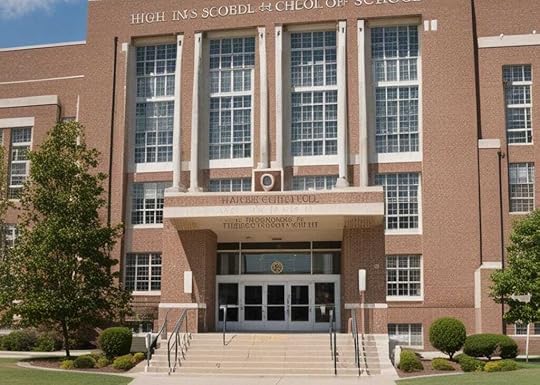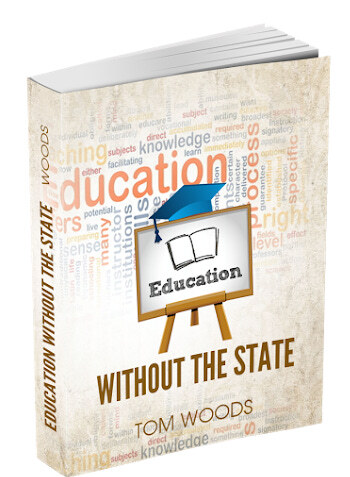Official Breakdown and Review: Education Without the State by Tom Woods - Part I

Education Without the State. Those four words can sum up my upcoming book slated to be released in late 2025, The Arcane Prophecy, its free prequel novella entitled Arcane Awakenings, and the entire Arcane Elemental Academy Series.
The Libertarian Book Reviewer is a reader-supported publication. To receive new posts and support my work, consider becoming a free or paid subscriber.
Of course, Dr. Robert Murphy’s work, Chaos Theory, will also deserve a look. But with Aurora Village and the Northern Region in the nation of Etharia serving as background info for Book I, I wanted to start this journey of nonfiction influences to the series with what has become my open opposition to state-funded education.
Now, before I go any further, I’d like to at least give the naysayers something to think about. Every time one opposes something that the welfare state “provides,” like education, the erroneous claim that we don’t give a (fill in the blank with whatever word or phrase you’d like) about kids. Or at least, we don’t care about the poor receiving their “right” to an education, or something similar.
That said, check out what the great Frederic Bastiat has to say about the issue:
“...every time we object to a thing being done by government, the socialists conclude that we object to its being done at all. We disapprove of state education. Then the socialists say that we are opposed to any education. We object to a state religion. Then the socialists say that we want no religion at all. We object to a state-enforced equality. Then they say that we are against equality. And so on, and so on. It is as if the socialists were to accuse us of not wanting persons to eat because we do not want the state to raise grain.”
If anything, you can argue those who say the state should stop intervening in education care more about it. And it’s what Tom Woods’ Education Without the State drives home. This book is actually a transcript that starts with Episode 62 of the Tom Woods Show, so it was more than a minute before I started listening to the podcast.
But reading the transcript as opposed to listening to it will let me review and break down the work a little deeper than if I tried to retain it. Because I’ll be real: Listening to something is great, but I got one notorious tendency for letting something enter one ear and leave the other.
Thanks for reading The Libertarian Book Reviewer! This post is public so feel free to share it.
Anyway, enough chatter. Let’s get started with Chapters 1 and 2 in this three-part series.
Education Without the State? - Chapter 1Separating School and StateThe first chapter involved Tom Woods interviewing and playing devil’s advocate against Sheldon Richman. The following quick bullet points provide a full summary of what Woods and Richman discussed. Again, Woods is the devil’s advocate and Richman is debunking what’s thrown at him.
The claim schools “have been deprived of funds.”
How working families can afford tuition.
The potential lack of compulsory attendance laws in a libertarian society.
The issue with vouchers.
Issues with the approach taken in the K-12 environment.
Arguably my favorite part of the book.
Overall, Sheldon Richman did a fantastic job of debunking some of the more common arguments and issues shown in the bulleted list above. It also enticed me to add his book, Separating School and State to my TBR for a deeper overview of these issues.
Parents who would undoubtedly be concerned with what a society would look like without the State “providing” education would get a sound overview in Chapter 1. Chances are, this chapter alone would at least quell some fears.
Chapter 2Low-Cost Private Schools in the Developing WorldMoving onto Chapter 2, this discussion occurred in Episode 71, shortly after Woods’ talk with Richman. It involved Pauline Dixon, who discussed the issue of “Low-Cost Private Schools in the Developing World.”
This was an interesting chapter, especially since we’re getting one’s personal experience in the matter, mainly in India and Africa. Pauline will show the reader shortcomings in government-provided education, such as teacher no-shows and the curriculum confining itself to teaching just one language as opposed to what the low-cost private model offered.
Pauline also drove one point home and it’s the primary takeaway here: That yes, private education can and does thrive in low-income or developing countries. And that says a lot. The best example laid out discussed Kibera after the introduction of government schooling.
Despite what you may have thought, the private schools ultimately won out thanks to two factors that jumped out at me: Accountability, and the fact that the teaching staff and its entrepreneurs had come from within the community. That said, they understood the students’ needs better than the government schools, whose incoming staff didn’t recognize those needs with the same kind of urgency.
Tom did raise an objection (again, devil’s advocate) here, asking whether Pauline could “qualitatively compare” these private schools to the government ones.
It was good to see that Pauline was ready for this one, and her team did their jobs, which comprised conducting the following:
Talking to parents
Survey of inputs in each school
Survey of achievement
Data on family background
Multilevel modeling analysis
Thorough, right?
Overall ThoughtsThis one is off to a great start, both in addressing concerns parents may have regarding alternatives to government schooling, plus data derived from the third world on the overall benefits and achievements those attending small private schools had over their government counterparts.




